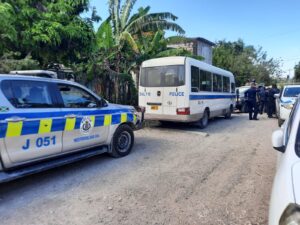Police pin hope on new task force to boost criminal convictions
DEPUTY commissioner of police Mark Shields is shortly to launch his new crack team of investigators whose job it will be to outwit criminal offenders and bring them to justice, an area of policing in which the constabulary now has a poor record.
The task force is to be headed by an assistant commissioner of police, but Shields did not say which of the approximately 11 officers who hold the rank are under consideration.
“The establishment of the task force is in fact an extension of the highly successful formula we have used in Operation Kingfish and elsewhere in the world,” said Shields, Jamaica’s crime chief.
Kingfish, a one-year-old intelligence-driven operation headed by ACP Glenmore Hinds, specialises in dismantling gangs and criminal networks, so far with significant levels of success.
Shield’s new task force will be reactive, meaning it will have an investigatory arm to solve crimes after their commission, said the chief detective.
But it will also be proactive, he said, utilising police squads to hunt down specific criminals responsible for murder, shootings and other serious crimes.
“We’ll have full task force investigation teams, supported by an intelligence cell and a review team who will assure the quality of investigations and case management,” said the deputy commissioner.
The task force is to comprise 100 to 120 police officers from across the island, but initially will centre its activities in the capital, where the majority of serious crimes are committed.
“The whole point of it will be to support one of the commissioner’s primary objectives, which is to reduce the homicides and shootings and we feel that this structure and approach will achieve that aim,” the DCP said.
Important to achieving this, he said, is consistency in the ‘cleared up’ rate of investigations, which currently stands at between 33 and 35 per cent over all.
But cleared up murder investigations fluctuate depending on the number of cases an investigator is handling at any one time, according to Shields.
In the metro area, for example, the cleared up rate fluctuates from 21 per cent to 41 per cent, while in rural areas, it ranges as high as 52 per cent in some divisions.
Said the crime chief: “That is not rocket science – if the case load is too heavy for an officer, then the cleared up rate falls, in some cases, dramatically.”
Part of the task force’s job is to address the imbalance, by prioritising investigations. The metro area is its key focus as the majority of murders – 71 per cent up to November 6 – are committed in its eight police divisions, which are spread across Kingston, St Andrew and St Catherine.
Of the 1,008 metro murders officially on the police books to early November, 38 per cent were listed as cleared; down from 43 per cent in the year prior.
A case is prioritised “where suspects are named or where there is a strong likelihood that we can identify a suspect,” said Shields.
But: “Having said that, every case will meet a minimum standard in order that when a suspect comes to light we can access the file and continue with the investigations.”
Shields refused, however, to commit himself by stating his target for solved murders, saying that would be done after discussions with constabulary colleagues on a realistic goal.
“At the end of the day, there is no point setting an unrealistic figure. That would raise the expectation of the public if the figure is too high and equally it could damage the morale of the organisation.”
Selection of task force members is already underway by senior officers in the Criminal Investigation Branch.
“They will be drawn from the existing homicide teams and from the divisions. We will be looking for first class investigators, who have a proven good investigative track record and, above all, professionalism and integrity,” said Shields.
Already, some 70 new crime scene investigators have been trained and added to the corps of detectives. Another batch is to be trained in this year, and Shields said the Flying Squad, a crack team trained to handle dangerous situations, would be expanded.
The force is also in the process of installing new forensic and other technologies to help analyse evidence.
Shields hopes his task force, by taking a more scientific approach to criminal probes, can increase conviction rates. The team is to be intelligence driven.
“Without an effective intelligence process it would be more difficult for us to identify criminals and solve other serious crimes,” he said.
“The fundamental success of any approach is built on intelligence and that is why the work of DCP (Charles) Scarlett is so critical.”
Scarlett was recently named head of intelligence.
“Even if we are charging less people, but increasing the quality of our files and the conviction rates, that would be, in my view, an improvement,” said Shields.
“We can ensure that we maintain high standards of investigations and instill confidence in the DPP (Director of Public Prosecutions), when they receive a file that it is of a good standard.”
williamsp@jamaicaobserver.com












